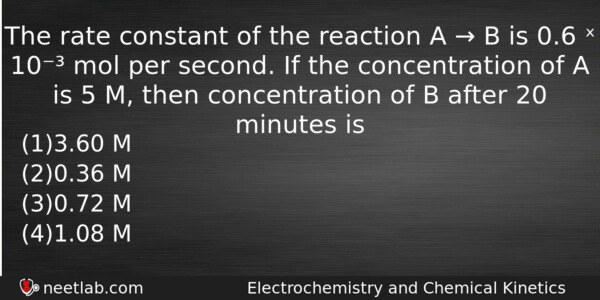| ⇦ | 
| ⇨ |
The rate constant of the reaction A → B is 0.6 ˣ 10⁻³ mol per second. If the concentration of A is 5 M, then concentration of B after 20 minutes is
Options
(a) 3.60 M
(b) 0.36 M
(c) 0.72 M
(d) 1.08 M
Correct Answer:
0.72 M
Explanation:
No explanation available. Be the first to write the explanation for this question by commenting below.
Related Questions: - Number of isomers of C₄H₁₀ is
- At 25⁰C the pH value of a solution is 6, then the solution is
- The trivial names of propanone and 3-methyl-2-butanone are
- Molar volume of CO₂ is maximum at
- DDT is prepared by reacting chlorobenzen with
Topics: Electrochemistry and Chemical Kinetics
(87)
Subject: Chemistry
(2512)
Important MCQs Based on Medical Entrance Examinations To Improve Your NEET Score
- Number of isomers of C₄H₁₀ is
- At 25⁰C the pH value of a solution is 6, then the solution is
- The trivial names of propanone and 3-methyl-2-butanone are
- Molar volume of CO₂ is maximum at
- DDT is prepared by reacting chlorobenzen with
Topics: Electrochemistry and Chemical Kinetics (87)
Subject: Chemistry (2512)
Important MCQs Based on Medical Entrance Examinations To Improve Your NEET Score
18000+ students are using NEETLab to improve their score. What about you?
Solve Previous Year MCQs, Mock Tests, Topicwise Practice Tests, Identify Weak Topics, Formula Flash cards and much more is available in NEETLab Android App to improve your NEET score.
Share this page with your friends

Reaction is of zero order as the unit of rate constant is mol L⁻¹ S⁻¹
.·. Concentration of B =k × t =0.6×10⁻³ × 20 × 60 = 0.72 M
Let at time t=0 (A)= a and (B)=0
At time t=(20*60)sec (A)= (a-x) and (B)=x then
For 1st order reaction
(A’) =(A) – kt
: a-x = a – 0.6*10-3*20*60
Solving it will give
X= 0.72 M